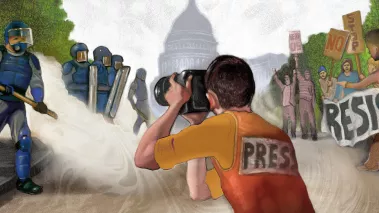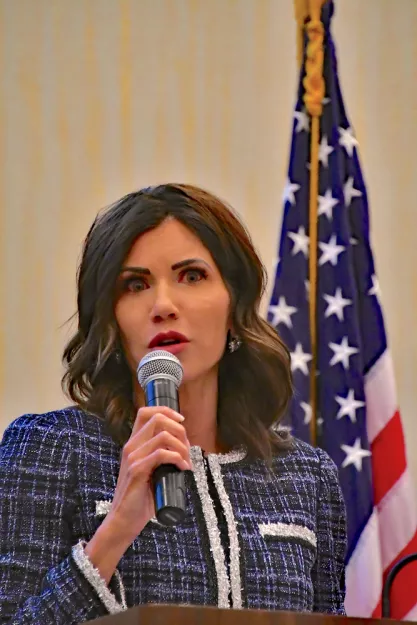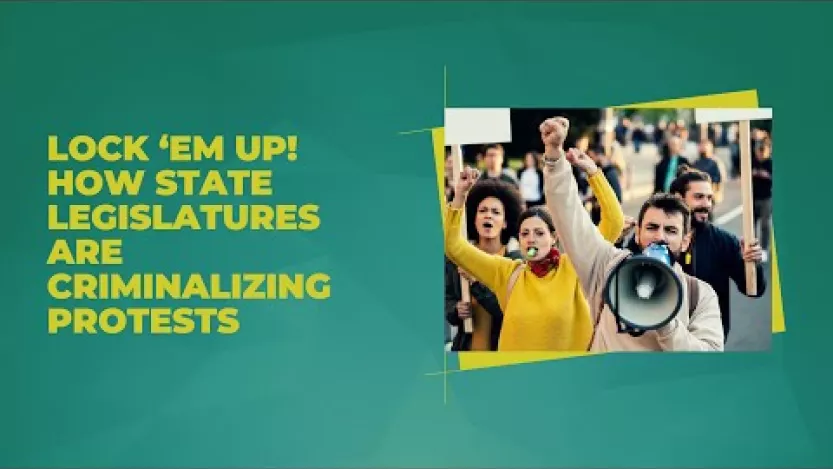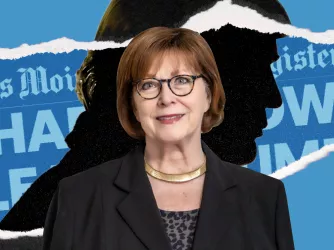Table of Contents
New Knight First Amendment Institute report and documentary: ‘Covering Democracy: Protests, police, and the press’ — First Amendment News 381

Dominic Bodden / Knight First Amendment Institute at Columbia University
On June 20 at 6 p.m., the folks over at the Knight First Amendment Institute will host an advanced screening of the Institute’s soon-to-be-released short documentary film exploring the issues examined in a new report by Joel Simon. See information below:
In the summer of 2020, as social justice protests exploded across the country, police arrested more than 100 journalists covering the demonstrations and assaulted hundreds more. The frequency and intensity of these incidents threatened press freedom and undermined fundamental rights at the heart of American democracy.
A new Knight First Amendment Institute report entitled “Covering Democracy: Protests, police, and the press,” written by Joel Simon — founding director of the Journalism Protection Initiative at the Newmark J-School and a 2022-2023 visiting fellow at the Knight Institute — documents the escalating antagonism between the press and the police and looks at the historical and social contexts giving rise to the current situation.
The evening will kick off with an advanced screening of the Knight Institute’s soon-to-be-released short documentary film exploring the same issues, ‘Flashpoint: Protests, Policing, and the Press.’ The film features the stories of several journalists who were assaulted or arrested while reporting at protests and explores the conflict and tension experienced on the frontlines, the changing role of the press, and the hardening of attitudes among the police toward journalists.
A conversation and Q&A will follow the screening.
Co-sponsored by the Knight First Amendment Institute at Columbia University and the Craig Newmark Graduate School of Journalism.
The event is free and open to the public. Please RSVP to attend.
Opening Remarks
- Graciela Mochkofsky, Newmark J-School
Panelists
- Ashanti Blaize-Hopkins, Society of Professional Journalists
- Katy Glenn Bass, Knight First Amendment Institute
- Stephanie Keith, Photojournalist
- Ed Ou, Documentary Journalist
- Joel Simon, Newmark J-School
Moderator
- Ali Velshi, MSNBC
Related
- “‘The First Amendment and the Right to Record Police’ documentary wins international television award,” First Amendment News 380 (May 24)
European court holds public official criminally liable for failure to remove ‘hate speech’ from social media account
- Jacob Mchangama and Jeff Kosseff, “How to Kill Online Free Speech,” Time (May 30)

According to a new landmark decision by the European Court of Human Rights (ECHR), freedom of expression does not immunize public officials from criminal liability if they fail to promptly remove manifestly illegal content (such as “hate speech”) posted on their accounts by followers. The recent decision reveals the censorial route that Europe’s judiciary is choosing, and it provides a cautionary tale as the U.S. Supreme Court faces many challenges to its robust protections for online speech.
In Sanchez v. France, the mayor of a French village, local councilor, and parliamentary candidate for the right-wing Rassemblement National Party used his Facebook account to mock a rival political party’s failing website. Some users commented on the posting, accusing the rival political party of being “allies of the muslims” and describing the city of Nimes as being infested by “Drug trafficking run by the muslims” and where “stones get thrown at cars belonging to ‘white people.’”
Even though one of the comments was quickly deleted by the user and the politician warned his Facebook followers to “be careful with the content of [their] comments,” he was convicted for incitement to religious hatred and fined 3,000 euros. In its decision, the ECHR stressed that due to a politician’s “particular status and position in society,” he or she is more likely to “influence voters, or even to incite them, directly or indirectly, to adopt positions and conduct that may prove unlawful” and therefore politicians must be “all the more vigilant” in policing content.
Related
- Sanchez v. France (European Court of Human Rights (2023))
Sanchez v. France: Case summary and outcome
From Columbia Global Freedom of Expression:
The Fifth Section of the European Court of Human Rights held that the conviction of a politician for failing to promptly delete unlawful comments published by third parties on the public wall of his Facebook account did not breach his Article 10 rights despite his apparent lack of knowledge of the comments. The application was filed by Julien Sanchez, a local elected representative and candidate in the legislative elections, who was convicted for incitement to hatred or violence against the people of the Muslim faith. While the Court stressed the importance of protecting freedom of expression in the context of political debate, it found “the French courts’ decision to convict Mr Sanchez had been based on relevant and sufficient reasons linked to his lack of vigilance and responsiveness” in monitoring his page for comments that could violate community standards or be unlawful.
Sanchez v. France has been referred to the Grand Chamber and hence the judgment is not final.
Jane Bambauer accepts joint appointment at University of Florida
- “Jane Bambauer Named UFCJC Brechner Eminent Scholar and Marion B. Brechner First Amendment Project Director,” College of Journalism and Communications, University of Florida (May 4)

The University of Florida College of Journalism and Communications (UFCJC) and Levin College of Law announced today that First Amendment scholar and teacher Jane Bambauer has been named UFCJC’s Brechner Eminent Scholar in Mass Communication and professor of law at Levin. Bambauer also will assume leadership of the Marion B. Brechner First Amendment Project at UFCJC.
She will join UF in the fall.
Bambauer is currently the Dorothy H. & Lewis Rosenstiel Distinguished Professor of Law at the University of Arizona James E. Rogers College of Law. She teaches and studies the fundamental problems of information technologies. Her research assesses the social costs and benefits of Big Data, and how new information technologies affect free speech, privacy and competitive markets.
Bambauer is a co-founder and executive editor of the Journal of Free Speech Law, the first peer-reviewed journal of its sort. She also serves as the co-deputy director of the Center for Quantum Networks, a multi-institutional engineering research center funded by the National Science Foundation, where she facilitates research on economic and regulatory policy for emerging markets in quantum technologies.
Bambauer’s work has been featured in over 20 scholarly publications including the Stanford Law Review, the Michigan Law Review, the California Law Review, and the Journal of Empirical Legal Studies. Her work has been featured in media outlets including The Washington Post, The New York Times, Fox News, and Lawfare, where she is now a contributing editor.
Bambauer holds a B.S. in Mathematics from Yale College and a J.D. from Yale Law School.
Wiping the case off the books: Hasen on Eastman’s cert petition
- Rick Hasen, “John Eastman Offers Warped View of 2020 Election, the January 6 ‘incursion into the Capitol,’ and His Attempt to Subvert Election, in Supreme Court Brief Seeking to Erase District Court Case Finding He and Trump Likely Participated in a Crime,” Election Law Blog (May 28)
Via Tierney Sneed at CNN, comes this cert. petition before the Supreme Court in No. 22-1138. Eastman is asking for a Munsingwear vacatur of a federal district court ruling, which would wipe that case off the books on grounds it is moot. The case held that Trump and Eastman likely committed a crime in how they tried to interfere with the electoral college vote and turn an election loser into an election winner. Eastman now argues the case is moot because the documents and been released, and the ruling “created a stigma for both Petitioner and his client, the former President of the United States and current candidate for the presidency.”
Gov. Noem on banning drag shows while touting free speech
- Andrew Stanton, “GOP Gov. Kristi Noem Demands Drag Show Ban While Touting ‘Free Speech’,” Newsweek (May 27)

South Dakota Governor Kristi Noem called for a ban on drag performances at public universities in a memo that also touted efforts to protect “free speech” on college campuses.
Noem released a memo on Friday detailing new plans to improve higher education in South Dakota, which currently has a 6-year graduation rate below the national average. In the memo, Noem calls for a flurry of new policies aimed at making the state a model for ‘strong, conservative’ higher education. Noem's plan, however, is also facing scrutiny for allegedly calling for restrictions on LGBTQ+ students' rights, including the removal of any mentions of “preferred pronouns” in school materials and a ban on drag shows.
South Dakota Governor Kristi Noem called for a ban on drag performances at public universities in a memo that also touted efforts to protect ‘free speech’ on college campuses. Noem released a memo on Friday detailing new plans to improve higher education in South Dakota, which currently has a 6-year graduation rate below the national average. In the memo, Noem calls for a flurry of new policies aimed at making the state a model for ‘strong, conservative’ higher education. Noem's plan, however, is also facing scrutiny for allegedly calling for restrictions on LGBTQ+ students’ rights, including the removal of any mentions of “preferred pronouns” in school materials and a ban on drag shows.
Related
- Greg Gonzales, “What a drag — Montana outlaws ‘glamorous’ attire in public schools and libraries,” FIRE (May 26)
Institute for Free Speech report on impact of campaign finance laws on corruption
- Alec Greven, “Do States with Fewer Campaign Finance Regulations Have More Corruption?” Institute for Free Speech (May 24)

The impact of campaign finance regulations on corruption is important for two related reasons. First, campaign finance statutes are often passed with a claim by sponsors that the measure would protect against corruption. Second, the corruption mitigation effects are central to the constitutionality of the laws themselves.
Most campaign finance regulations implicate the First Amendment because they limit how individuals and groups can raise and spend money to speak on political issues. In the landmark campaign finance decision Buckley v. Valeo, the Supreme Court ruled that preventing corruption or the appearance of corruption are the primary legitimate government interests justifying campaign finance laws. Any campaign finance regulation, therefore, that limits free expression without demonstrating it prevents corruption or the appearance of corruption is constitutionally suspect.
This report examines the relationship between the states with the most corruption and the states that offer the widest range of free political expression. The states that perform the best on free political expression metrics, in this context, are those that have the fewest campaign finance restrictions. If more campaign finance regulations indeed prevent corruption, then we would expect that states with the least campaign finance restrictions to have higher rates of corruption.
The report finds the opposite. Almost no states that rank highly for free political expression are highly ranked states for corruption. In fact, states that have the most robust free expression protections outperform the national average for per capita rates of corruption.
More on Dominion v. Fox case
Jim Rutenberg, Michael S. Schmidt, and Jeremy W. Peters, “Missteps and Miscalculations: Inside Fox’s Legal and Business Debacle,” The New York Times Magazine (May 27)
In August 2021, the Fox Corporation board of directors gathered on the company’s movie studio lot in Los Angeles. Among the topics on the agenda: Dominion Voting Systems’ $1.6 billion defamation lawsuit against its cable news network, Fox News.
The suit posed a threat to the company’s finances and reputation. But Fox’s chief legal officer, Viet Dinh, reassured the board: Even if the company lost at trial, it would ultimately prevail. The First Amendment was on Fox’s side, he explained, even if proving so could require going to the Supreme Court.
Mr. Dinh told others inside the company that Fox’s possible legal costs, at tens of millions of dollars, could outstrip any damages the company would have to pay to Dominion.
That determination informed a series of missteps and miscalculations over the next 20 months, according to a New York Times review of court and business records, and interviews with roughly a dozen people directly involved in or briefed on the company’s decision-making.
Related
- “Post-settlement First Amendment Salon: Lawyers for Dominion and Fox exchange views,” First Amendment News 379 (May 17)
YouTube: State legislatures criminalizing protests
- Jeffrey Filipovits, Sabine von Mering, Brian Hauss, and Stephen Rohde, “Lock ‘Em Up! How State Legislatures Are Criminalizing Protests,” Beverly Hills Bar Association (May 26)
Since January 2017, 45 states have considered 267 bills to restrict the right to protest.

New book: Gregg Jarrett on Darrow and Scopes trial
- Gregg Jarrett with Don Yaeger, “The Trial of the Century” (Threshold Editions, 2023)
Nearly a century ago, famed liberal attorney Clarence Darrow defended schoolteacher John Scopes in a blockbuster legal proceeding that brought the attention of the entire country to the small town of Dayton, Tennessee. Darrow’s seminal defense of freedom of speech helped form the legal bedrock on which our civi liberties depend today.
Expertly researched, eye-opening, and stirring, The Trial of the Century calls upon our past to unite Americans in the defense of the free exchange of ideas, especially in this divided time.
Related
- Gregg Jarrett, “Free speech rights survived epic challenge from man who tried to monkey with them in ‘Trial of the Century’,” Fox News (May 30)
New scholarly article on social media influencers and FTC regulation
- Hannibal Travis, “The Freedom of Influencing,” Miami Law Review (2023)
Social media stars and the Federal Trade Commission (“FTC”) Act are clashing. Influencer marketing is a preferred way for entertainers, pundits, and everyday people to monetize their audiences and popularity. Manufacturers, service providers, retailers, and advertising agencies leverage influencers to reach into millions or even billions of consumer devices, capturing minutes or seconds of the market’s fleeting attention. FTC enforcement actions and private lawsuits have targeted influencers for failing to disclose the nature of a sponsorship relationship with a manufacturer, marketer, or service provider. Such a failure to disclose payments prominently is very common in Hollywood films and on radio and television, however. The Code of Federal Regulations, FTC notices, and press releases contain exemptions tailored to such legacy media.
This Article addresses whether the disparate treatment of social media influencers and certain legacy media formats may amount to a content-based regulation of speech that violates the freedom of speech. Drawing on intellectual property law, consumer law, and securities law precedents, it argues that the more intense focus on disclosures by social media influencers infringes the freedom of influencing. It is irrational and discriminatory to impose greater obligations on influencers who are paid to mention or use products or services than on legacy media formats whose actors or directors mention or use similar products or services.
More in the news
- Jessica Wills, “Princetonians for Free Speech launch a new survey to measure the success of free speech advocacy,” FIRE (May 30)
- Kenan Malik, “If you defend free speech, you must defend it all and not silence those you disagree,” The Guardian (May 28)
- Susanna Granieri, “Supreme Court Declines to Hold Tech Companies Liable for Hosted Content,” First Amendment Watch (May 26)
- Andrew Dalton, “‘Romeo & Juliet’ stars' lawsuit over 1968 film's teen nude scene tossed,” The Free Speech Center (May 26)
- Freida Frisaro, “Amanda Gorman's poem for Biden's inauguration banned by Fla. school,” The Free Speech Center (May 25)
- Susanna Granieri, “DeSantis Defunds Diversity and Inclusion Programs in Florida Public Higher Education,” First Amendment Watch (May 18)
2022-2023 SCOTUS term: Free expression and related cases
Review granted
- O’Connor-Ratcliff v. Garnier
- 303 Creative LLC v. Elenis (argued Dec. 5)
- Jack Daniel’s Properties, Inc. v. VIP Products LLC (argued March 22)
- United States v. Hansen (argued, March 27) (Volokh commentary here)
- Counterman v. Colorado (argued, April 19)
Pending petitions
- Mazo v. Way
- Tingley v. Ferguson
- Frese v. Formella
- National Rifle Association of America v. Vullo
- Mobilize the Message v. Bonta
- Vidal v. Elster
- U.S. v. Hernandez-Calvillo
- Moody v. NetChoice, LLC
- NetChoice, LLC v. Moody
- Florida v. NetChoice
- Klein v. Oregon Bureau of Labor and Industries
State action
- O’Connor-Ratcliff v. Garnier (cert. granted)
- Lindke v. Freed (cert. granted)
Qualified immunity
- Novak v. City of Parma (cert. denied)
Immunity under Foreign Sovereign Immunities Act
- NSO Group Technologies Limited v. WhatsApp, Inc. (cert. denied)
Liability Anti-Terrorism Act
- Twitter v. Taamneh (held, 9-0 per Thomas, J.: SCOTUSblog: “Plaintiffs’ allegations that the social-media-company defendants aided and abetted ISIS in its terrorist attack on a nightclub in Instanbul, Turkey fail to state a claim under 18 U.S.C. § 2333(d)(2).”)
Section 230 immunity
- Gonzalez v. Google (held, 9-0, per curiam, SCOTUSblog: “The 9th Circuit’s judgment — which held that plaintiffs’ complaint was barred by Section 230 of the Communications Decency Act — is vacated, and the case is remanded for reconsideration in light of the court’s decision in Twitter, Inc. v. Taamneh.”)
Review denied
Previous FAN
FAN 380: “‘The First Amendment and the Right to Record Police’ documentary wins international television award”
This article is part of First Amendment News, an editorially independent publication edited by Ronald K.L. Collins and hosted by FIRE as part of our mission to educate the public about First Amendment issues. The opinions expressed are those of the article's author(s) and may not reflect the opinions of FIRE or of Mr. Collins.
Recent Articles
FIRE’s award-winning Newsdesk covers the free speech news you need to stay informed.

FIRE’s defense of pollster J. Ann Selzer against Donald Trump’s lawsuit is First Amendment 101

University of Washington alumni seek to revive the spirit of free inquiry

Meta’s content moderation changes closely align with FIRE recommendations


